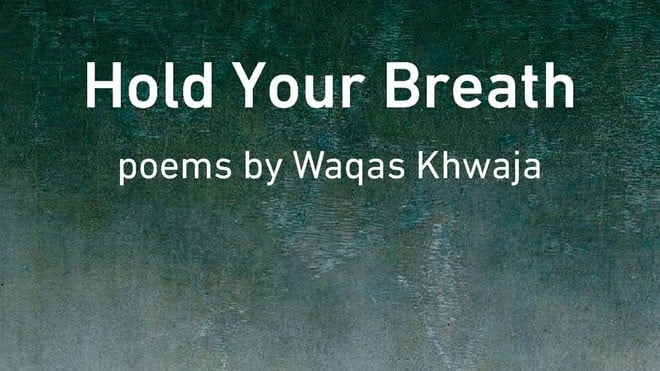
Waqas Khwaja transports a culturally unique experience and sensibility into the poems in his recent collection

South Asian writers have asserted their presence globally by employing English, the global lingua franca, as the medium for conveying their unique literary and aesthetic sensibility.
It all started with Sake Dean Mahomed (this is how Sheikh Din Muhammad spelled his name), who was a Bengali surgeon and an entrepreneur of Anglo-Indian origins. Dean Mahomed travelled to Europe and wrote about his travels. The Travels of Dean Mahomed, published in 1794, is generally considered to be the first book in English written by a South Asian. The book is dedicated to "William A. Bailie, Esq., Colonel in the Service of The Honourable the East India Company."
It is quite ironic that the book that began the entire postcolonial literary enterprise is written by an Anglo-Indian Muslim who dedicated his intellectual effort to an officer of East India Company that had been defeated by Hyder Ali and his son Tipu Sultan in the Battle of Pollilur in 1780.
From this hybrid and at the same time Eurocentric beginning, South Asian literature in English went on to produce a formidable body of work. Ahmed Ali and Sajjad Zaheer created a great deal of problems for the British Empire by using English for creating left-leaning and anti-imperialistic literature. Mimicry gave way to assertion of independence and the margins of the empire started "writing back" to the centre.
This coloniser-colonised binary got disrupted when the people of South Asia started moving all over the globe and nostalgia and the loss of homeland became political acts. Home was not where the author was located. It was always elsewhere or permanently lost in the process of migration/immigration.
South Asians in North America did not always feel that talking back to the British Empire was necessary. They could simply infect English with their local/desi/Persian/Mughal/Urdu/Punjabi sensibility. Agha Shahid Ali started composing ghazals in English while teaching in the US. He even inspired non-desi poets to write ghazals and collected more than a hundred of them in Ravishing DisUnities: Real Ghazals in English. This collection includes ghazals by John Hollander, Maxine Kumin, Heather McHugh, and W. S. Merwin.
By this time, ‘ghazalesque’ became a valid descriptor for this unique sensibility attached to a literary form brought to North America from South Asia.
It is within this tradition of South Asian writing in North America that we find the volume under review a significant intervention and a valuable addition. The poems in this volume make Agha Shahid Ali’s work appear traditional and bound to specific forms. Waqas Khwaja has created poems which are postmodern and traditional at the same time.
This point needs to be illustrated. Indian musical compositions or ragas are very traditional iterations of the local culture. Ragas are part of religious incantations and also independent of words. Musical notes are spoken but words are not required. A singer can simply speak the notes and the rhythms and create a meditation on the genre being sung (khayal).
Waqas Khwaja has tried to transport this culturally unique experience and sensibility into his poems written in English. The resulting poems display a postmodern juxtaposition: a khayal (composed within a raga) transforms itself into a visual poem. For example, in a poem titled ‘Piya Torey Nain’, the Urdu/Hindi words of the title are translated into ‘Beloved Your Eyes’ and then the alaap begins visually as well as the way a singer would utter them.
This experience of conveying something that was originally beyond words and was supposed to invoke the metaphysical presence is being captured in writing, which, for Jacques Derrida at least, is a non-metaphysical system of representation. The written symbols on the page have to be seen for any meaning to be inferred.
These experimental poems of Waqas Khwaja make this book a culturally path-breaking venture. The local is being globalised but without any attempt to assimilate to the Eurocentric strictures of writing poetry in English or without caring about the demands of the established literary canon. This is different from what Quentin Tarantino did with Nusrat Fateh Ali Khan’s ‘Allah Muhammad Char Yar’ in his Natural Born Killers. Tarantino used Nusrat’s vocal intensity to give a sublime effect to the rampant murders of his protagonists. That was South Asian traditional art being appropriated to produce a posthuman sublime moment in a movie which was essentially about the murdering capacity of the white people.
The form of English poetry that Waqas Khwaja has invented in this book will be (and should be) discussed at all those sites where postcolonial cultural productions are discussed. The centre is going to be provincialised soon.